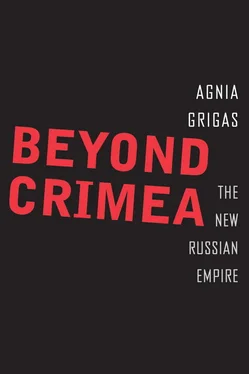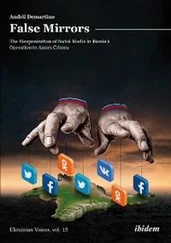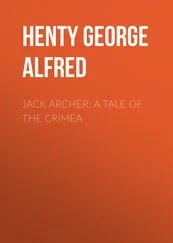Agnia Grigas - Beyond Crimea
Здесь есть возможность читать онлайн «Agnia Grigas - Beyond Crimea» весь текст электронной книги совершенно бесплатно (целиком полную версию без сокращений). В некоторых случаях можно слушать аудио, скачать через торрент в формате fb2 и присутствует краткое содержание. Город: New Haven, Год выпуска: 2016, ISBN: 2016, Издательство: Yale University Press, Жанр: Политика, Публицистика, на английском языке. Описание произведения, (предисловие) а так же отзывы посетителей доступны на портале библиотеки ЛибКат.
- Название:Beyond Crimea
- Автор:
- Издательство:Yale University Press
- Жанр:
- Год:2016
- Город:New Haven
- ISBN:978-0-300-21450-5
- Рейтинг книги:4 / 5. Голосов: 1
-
Избранное:Добавить в избранное
- Отзывы:
-
Ваша оценка:
- 80
- 1
- 2
- 3
- 4
- 5
Beyond Crimea: краткое содержание, описание и аннотация
Предлагаем к чтению аннотацию, описание, краткое содержание или предисловие (зависит от того, что написал сам автор книги «Beyond Crimea»). Если вы не нашли необходимую информацию о книге — напишите в комментариях, мы постараемся отыскать её.
[Contain tables.]
Beyond Crimea — читать онлайн бесплатно полную книгу (весь текст) целиком
Ниже представлен текст книги, разбитый по страницам. Система сохранения места последней прочитанной страницы, позволяет с удобством читать онлайн бесплатно книгу «Beyond Crimea», без необходимости каждый раз заново искать на чём Вы остановились. Поставьте закладку, и сможете в любой момент перейти на страницу, на которой закончили чтение.
Интервал:
Закладка:
Russia’s domestic political conditions also had an impact on the adoption of these documents. Parliamentary and presidential elections held in December 1995 and June 1996 prompted broader debates about compatriots and the country’s obligations to Russian citizens. 62A likely reason that Moscow still had failed to formulate legal definitions and policies toward its diaspora, despite the millions of ethnic Russians outside the borders of the Russian Federation, was that from 1993 to the end of the decade it simultaneously pursued a strategy toward its compatriots that contradicted its policy documents—one of turning them into Russian citizens. In the early 1990s, Moscow did not systematically pursue the passportization policy of handing out Russian citizenship to Russians and Russian speakers who are residents or citizens of foreign countries. Instead, the focus was on promoting the concept of dual citizenship in the former Soviet republics. Both methods of providing Russian citizenship would eventually come to serve Moscow’s policies of expansion in Ukraine’s Crimea, Moldova’s Transnistria, and Georgia’s South Ossetia and Abkhazia. Initially, though, the dual citizenship strategy was favored by another young reformer in Yeltsin’s team—Foreign Minister Andrey Kozyrev (1991–96). Appointed foreign minister a year shy of his fortieth birthday, Kozyrev was a sophisticated, experienced diplomat with a Ph.D. in history. Like others in Yeltsin’s circle, he believed in Western liberal democratic ideals and at the same time insisted that Russia be treated as a great power in international relations. Kozyrev held that promoting dual citizenship policies could serve as a “vital instrument” of Russia’s foreign policy toward the near abroad, and he aimed to issue Russian passports to all ethnic Russians living in former Soviet republics, as well as to people from other ethnic groups who had historical ties to Russia. 63
As foreign minister, Kozyrev personally sought to sign agreements with the former Soviet republics regarding dual citizenship, but the newly independent states were hardly enthusiastic. With the exception of Estonia and Latvia, all post-Soviet republics awarded their own citizenship to their entire populations, including Soviet-era immigrants. In November 1993, the Kazakh President Nursultan Nazarbayev made it clear that Kazakhstan’s Russian minority does not need Moscow’s passports or protection. The man who had once turned down Mikhail Gorbachev’s offer to run as vice president of the Soviet Union was once again turning down Moscow’s overtures. He presciently warned, “whenever one starts talking about the protection of Russians in Kazakhstan, not Russia, I recall Hitler who began to ‘support’ the Sudeten Germans at one time. I start feeling deep anxiety for Russians who live outside Russia. Really, they did not ask to be defended, did they? They are citizens of Kazakhstan.” 64The only states that signed up for dual citizenship agreements were Turkmenistan in 1993, when Yeltsin was also ceremonially offered a Turkmenistan passport, and Tajikistan in 1995. However, our discussion of Central Asia will show, Turkmenistan went to great lengths to prevent its citizens from gaining Russian passports and withdrew from the agreement in 2003. 65Spreading Russian citizenship was no success but it did not mean that Moscow abandoned this project altogether.
By 1999, the decade of the ailing Yeltsin’s leadership was winding down. Despite having issued four documents related to compatriots since 1994, the Russian government still lacked a coherent legal framework to address the approximately 25 million Russians living in the former Soviet states in addition to Russian speakers and other people of Russian descent living across the globe. Passportizing the compatriots also had not shown much progress. Overall, Yeltsin’s call to support and defend Russian compatriots was largely rhetorical, diplomatic, and tactical (as in the case of the Baltic States). Despite the rhetoric, Yeltsin generally pursued a policy of respect for international borders, as seen in his resistance to politicizing the Russian speakers of Crimea, who were already demonstrating for autonomy and separation from Ukraine in the early 1990s, his negotiation of the Friendship Treaty with Ukraine in 1997 recognizing its borders, and his eventual withdrawal of Russian troops from neighboring states without successfully extracting any guarantees for the local Russian-speaking populations. As the policies of the Yeltsin era demonstrated, compatriots were never a top priority for the Russian government.
In May 1999, with less than a year before Yeltsin’s resignation, the government released the “Federal Law on the State Policy of the Russian Federation Concerning Compatriots Abroad.” This law finally set the basic legal framework for and definition of compatriots. It defined them as those “who were born in one [Soviet Union or Russian] state, are living or lived in it” and who “share common language, history, heritage, traditions and customs,” as well as their direct descendants “residing outside the territory of the Russian Federation and related to peoples historically living on the territory of the Russian Federation,” except for “descendants of persons who belong to titular nations of foreign states.” 66For instance, it meant that an ethnic Russian woman and her descendants living in Ukraine would forever be compatriots, whereas an ethnic Ukrainian woman born during the Soviet era would be a compatriot while her Ukrainian children born after the fall of the USSR would no longer be compatriots. Likewise it implied that an Ossetian and his descendants living in Georgia or Uzbekistan would forever remain Russian compatriots. This contradiction is partly born from Stalin’s Soviet nationalities policies and his propagation of concepts of natsionalnost’ (ethnic rather than civic nationality, such as is customarily entered in passports) that are to this day preserved in Russia’s compatriot policies.
Furthermore, neither the aforementioned ethnic Russian nor the Ukrainian woman nor anyone else could request to be a Russian compatriot. The new law changed the right, set out in 1995, of the Soviet Union’s nationals to claim the status of compatriot. Instead, that status was automatically granted both to nationals of the former USSR and to Russia’s emigrants’ descendants if they self-identified as such. Self-identification, like the concept of compatriot itself, was a muddled affair. It was defined as identification with Russia or Russianness or declaration of loyalty to the Russian Federation, the process for which was never formalized in practice. 67The law also provided for compatriot ID cards but the project never achieved momentum and no such cards were ever issued. 68As a result, by 1999 there were two distinct elements in Russia’s compatriot policies: the imposition of the category on foreign states and peoples and room for self-identification as a compatriot. It is unlikely that with this definition Moscow would have tried to claim the entire 150-million population of the fourteen former Soviet republics as compatriots since most of them would not have self-identified as such, but it is feasible that the some 30 million Russian speakers would have been likely targets.
This broad concept of compatriots held some additional contradictions. First, there was a hierarchy in which a Russian “citizen” outranked a Russian “compatriot.” A compatriot was never equal to a Russian passport holder residing outside Russian borders (an expatriate), though an expatriate could also be called a compatriot. Second, the concept included Russian émigrés from the tsarist and Soviet eras and their descendants. Thus, an American-Russian woman or French-Russian woman with Russian ancestors who had fled the Soviet regime following the Revolution would also be included. In practice, however, there was a geographical distinction between regions where Moscow sought to protect and support compatriots. Generally, Russia was more interested in doing so in the post-Soviet republics, which it perceived as being part of its special sphere of influence. Despite state-funded Russian language schools and special status for the Russian language in most post-Soviet states—privileges not available to Russian speakers in the West—Russia increasingly took a combative line with the post-Soviet republics on compatriots’ rights. Compatriots in other parts of the world like North America or Western Europe, where Moscow held less sway, generally received less attention. 69Despite its contradictions and vagueness, however, the 1999 law remained in place for a decade with the most significant revisions coming into force in July 2010. 70
Читать дальшеИнтервал:
Закладка:
Похожие книги на «Beyond Crimea»
Представляем Вашему вниманию похожие книги на «Beyond Crimea» списком для выбора. Мы отобрали схожую по названию и смыслу литературу в надежде предоставить читателям больше вариантов отыскать новые, интересные, ещё непрочитанные произведения.
Обсуждение, отзывы о книге «Beyond Crimea» и просто собственные мнения читателей. Оставьте ваши комментарии, напишите, что Вы думаете о произведении, его смысле или главных героях. Укажите что конкретно понравилось, а что нет, и почему Вы так считаете.












